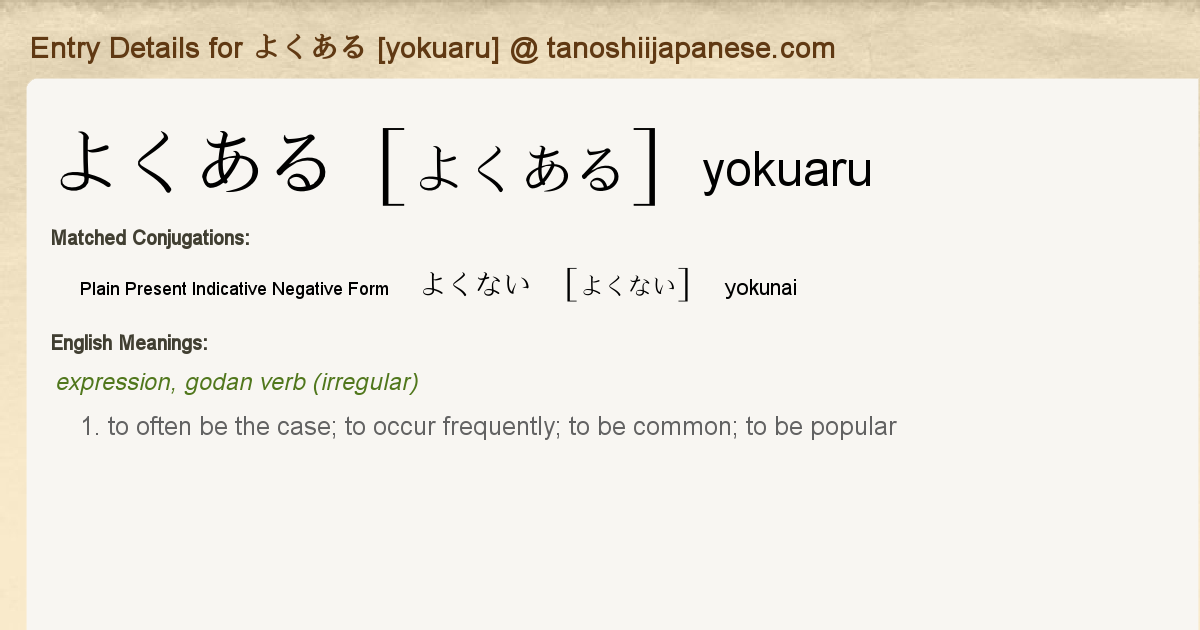

(My examples continue to get lamer from here)įor past positive, the 'i' changes to 'katta' (plus 'desu' if using the polite form).įor past negative, the 'i' changes to either 'ku arimasen' (plus 'deshita' for polite) or 'kunakatta' (plus 'desu' for polite). Kanojo wa amari shinsetsu ja arimasen deshita = She wasn't very nice In addition, just add the past negative tense of desu (ja nakatta or de wa arimasen deshita or ja arimasen deshita) to make it past tense negative. Just add the past tense form of desu (datta or deshita) to make it past tense. Once again, NA adjectives here will rely on da/desu to change tense, while I adjectives will transform: *'ii' becomes 'yokunai (desu)' or 'yoku arimasen'. Kono geemu wa tanoshiku arimasen = This game isn't funĪnata no joudan wa omoshirokunai = Your joke isn't funny Neko wa ureshikunai desu = It's an unhappy cat To make ~I adjectives negative in the polite present tense, there are two options:įor informal present tense, just change the 'i' into 'kunai'. These ones always change form themselves: the final 'i' will transform. Kanojo wa shinsetsu de wa arimasen = She isn't nice Kare no heya wa kirei ja nai = His room isn't clean Keep in mind that unlike the present positive discussed above, this form is not used directly before a noun:īecause these words do not change themselves, they rely on negative forms of da/desu:

To form negative adjectives, follow the rules below. The adjective ii (good, okay, well) is irregular in most forms. "Amari" is used directly before the adjective when it's being used in the negative sense. "Totemo" or "taihen" are used directly before the adjective when it's being used in the positive sense. One last note - the word "very" is often used with adjectives. However, when an adjective directly precedes desu/da, the 'na' on NA adjectives is dropped: Or they can be used with the copula desu/da to describe the noun. In standard use, they can come right before the noun: (I find that for some reason there's a much wider, better selection of ~I adjectives!)
#Totemo yokunai how to#
How to actually say it: "Naruhodo! Ippon toraremashita.~NA adjectives (they end with 'na', which is usually written apart from the adjective itself) It’s kind of like the English phrase “kick the bucket.” As an idiom it means “to die,” but if you change it to “punch the bucket,” suddenly it doesn’t make much sense. Ippon can mean anything from “one bottle” to “one home run,” so without the second part of the idiom to give it clear context, it’s just kind of floating there awkwardly with a generic meaning.

With the second half of the idiom changed, the first part suddenly makes no sense either. However, the speaker here replaced toraremashita (“was taken”) with ushinaimashita (“lost”). The phrase here should be ippon toraremashita, which means something like “can’t argue with that.” It literally means “one match was taken from me,” as if the person you’re speaking to is an opponent in a duel and they’ve won this round.

This one is a classic case of messing up a word in an idiom. Intended meaning: “I see! Can’t argue with that.”Īctual meaning: “I see! I lost a long cylindrical object.”


 0 kommentar(er)
0 kommentar(er)
